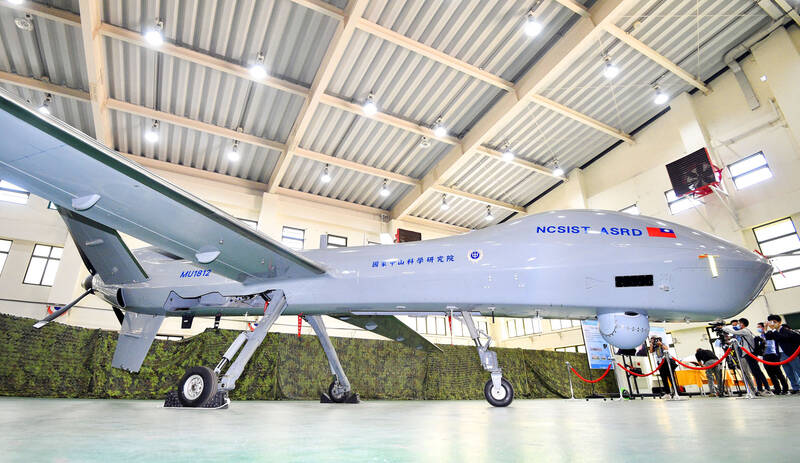The development of a fully domestic drone manufacturing supply chain is crucial to Taiwan’s ability to use the uncrewed aircraft effectively during wartime, a recent report from the Institute for National Defense and Security Research said.
Ukraine’s experience in resisting Russia’s invasion demonstrated that civilian drones can provide valuable intelligence during wartime, but they must be manufactured domestically to ensure that foreign component makers cannot take control of the devices, the report said.
In the report, institute researcher Chen Po-hung (陳柏宏) analyzed the security of Taiwan’s drone supply chain.

Photo: Lo Pei-te, Taipei Times
Ukrainians have used civilian drones to locate Russian convoys and other targets, he said, adding that drones have also helped them document battlefield conditions and gather evidence of war crimes.
“There are 78,000 civilian drones registered in Taiwan. That can definitely be a defensive advantage, but it depends on where the drones and their components are manufactured,” he said.
Citing an example of how China-made drones could be more of a bane than a boon on the battlefield, Chen said that drones made by Shenzhen DJI Sciences and Technologies Ltd and used by Ukrainian forces have allegedly been disabled by the company’s AeroScope technology.
The drones’ locations have also allegedly been shared with Russian forces to facilitate targeted bombardment of Ukrainian forces, he said.
The company has denied the allegations, saying that affected drones likely experienced signal issues, but doubts have remained, Chen said.
Taiwan’s supply chain faces several problems, such as a lack of raw materials and a small market, requiring the outsourcing of engines and other major components, he said.
“There are other challenges, like scale of production, integration capabilities and a lack of some key technologies,” Chen said. “There is a huge gap between civilian and military drones, and Taiwan is not able to compete on an international level in the drone industry, despite thriving domestic interest.”
The government must find a way to ensure that it can fully produce civilian drones locally if they are to be used in wartime, he said.
Taiwan’s state-run weapons developer last week said that it would complete the production of 104 domestically developed Chien Hsiang (劍翔) “suicide drones” by 2025.
An anti-radiation suicide drone — which targets enemy radar by detecting its electromagnetic emissions — has a maximum flight time of five hours and can strike targets 1,000km away, with an ability to target seaborne, coastal and inland Chinese radar systems, said Chi Li-ping (齊立平), head of the Chungshan Institute of Science and Technology’s Aeronautical Systems Research Division.
The institute’s Teng Yun (騰雲) drone is to enter mass production after it passes a combat readiness evaluation next year, Chi said.
The Teng Yun, which is to be used primarily for reconnaissance, comes with synthetic aperture radar and can be controlled via satellite, Chi said, adding that it has a maximum range of 1,100km and a 20-hour flight time.

Taiwan is stepping up plans to create self-sufficient supply chains for combat drones and increase foreign orders from the US to counter China’s numerical superiority, a defense official said on Saturday. Commenting on condition of anonymity, the official said the nation’s armed forces are in agreement with US Admiral Samuel Paparo’s assessment that Taiwan’s military must be prepared to turn the nation’s waters into a “hellscape” for the Chinese People’s Liberation Army (PLA). Paparo, the commander of the US Indo-Pacific Command, reiterated the concept during a Congressional hearing in Washington on Wednesday. He first coined the term in a security conference last

Prosecutors today declined to say who was questioned regarding alleged forgery on petitions to recall Democratic Progressive Party (DPP) legislators, after Chinese-language media earlier reported that members of the Chinese Nationalist Party (KMT) Youth League were brought in for questioning. The Ministry of Justice Investigation Bureau confirmed that two people had been questioned, but did not disclose any further information about the ongoing investigation. KMT Youth League members Lee Hsiao-liang (李孝亮) and Liu Szu-yin (劉思吟) — who are leading the effort to recall DPP caucus chief executive Rosalia Wu (吳思瑤) and Legislator Wu Pei-yi (吳沛憶) — both posted on Facebook saying: “I

Sung Chien-liang (宋建樑), who led efforts to recall Democratic Progressive Party (DPP) Legislator Lee Kun-cheng (李坤城), was released on bail of NT$80,000 today amid outcry over his decision to wear a Nazi armband to questioning the night before. Sung arrived at the New Taipei District Prosecutors’ Office for questioning in a recall petition forgery case last night wearing a red armband bearing a swastika, carrying a copy of Adolf Hitler’s Mein Kampf and giving a Nazi salute. Sung left the building at 1:15am without the armband and covering the book with his coat. Lee said today that this is a serious

A court has approved Kaohsiung prosecutors’ request that two people working for Democratic Progressive Party (DPP) Legislator Lin Dai-hua (林岱樺) be detained, as a probe into two cases allegedly involving her continues. The request was made on Friday, after prosecutors raided Lin’s two offices and the staffers’ residences, and questioned five on suspicion of contravening the Anti-Corruption Act (貪汙治罪條例). The people included the directors of Lin’s Daliao (大寮) and Linyuan (林園) district offices in Kaohsiung, surnamed Chou (周) and Lin (林) respectively, as well as three other staffers. The prosecutors’ move came after they interrogated Lin Dai-hua on Wednesday. She appeared solemn following